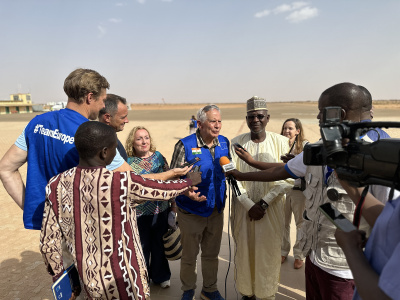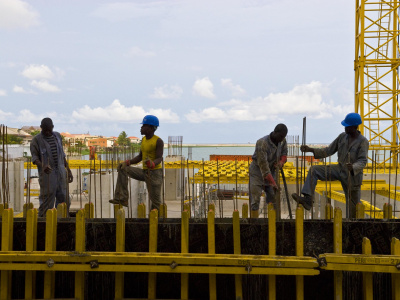
Can the closing space for CSOs in Africa be reopened?
Active citizens for effective and prosperous states
The positive and inclusive economic development that we are aspiring to in Africa requires a vibrant civil society and citizens taking a participative stand in it. Active citizens are fundamental prerequisites for the effective states that we need to change in Africa in order to meet the 2063 outcomes. It is therefore important that the issue of closing of CSOs’ space is dealt with at all levels and now urgently at continental level with a strong role from the African Union (AU) itself.
In a prosperous and democratic society, state and vibrant civil society are two sides of the same coin and must complement each other. Civil society must be seen as a reservoir of social capital capable of contributing to all aspects of the country’s development including health, education, peace, security etc. The role and influence of civil society in national and regional policy making does not diminish the relevance of governmental or inter-governmental processes —rather it enhances it. Nor does it lessen the authority of governments. While civil society can help to put issues on the agenda, only governments have the power to decide on them. The constructive engagement of civil society can reinforce deliberations by informing them, sensitising them to public opinion and grass-roots realities, increasing public understanding of decisions and enhancing accountability. On peace and security for example, because of its immersion within the society, civil society has vocation and the ability to contribute to peace building initiatives and social cohesion. Civil society has shown its capacity to organise collection, analysis and evaluation of first-hand information allowing the identification of the sources of potential tensions as well as emerging conflicts. Whereas traditional conflicts were well understood by diplomats and specialists in political science, adequately addressing new conflicts requires much more on-the-ground understanding, new skills of social and cultural analysis, the active involvement of communities and their leaders, links to vulnerable groups, bridges into mainstream development processes and new ways of working. Most of the time, civil society organisations have unique capacities in all those areas.Increased control and undue restrictions on CSOs
Unfortunately, in a growing number of African countries, there is increased control and undue restrictions on the formation and the activities of CSOs.
A common trend on this is to use the issue of foreign funding received by national civil society groups while there are no alternatives proposed by the government. Governments raise a variety of other reasons to justify the restrictive regulations. Some of the concerns are understandable, especially those genuinely linked to security, terrorism, religious extremism and other unlawful activities, but the majority are not and rather reflect a wiliness to shut down legitimate claims for fundamental human rights. In some cases even criticisms and alternative proposals for economic development and social choices are not tolerated. This is happening not just in Africa but globally. Some governments perceive CSOs as economic saboteurs, inciters of violence, or an extension of political opposition parties or even agents of foreign interest. Unfortunately in many cases, reacting to the shrinking of CSOs space, the international community and partner countries balance their interventions in preserving fundamental rights with competing economic and security interests. This is an additional wakeup call for citizens, especially in Africa, that the fight for civic space must be grounded within the continent at national, sub-regional and continental level.Civil society space at regional and continental level
Regional civil society and coalitions targeting regional and pan African institutions have an important role to play as a complement and a backup to national groups. They are less exposed to risks compared to national CSOs and in many cases they can really contribute, influence and pressurise member states through the regional and continental bodies on regional policy issues. Regional Economic Communities (RECs) react differently to CSO/non-state actor engagement. ECOWAS for example seems to be more open to CSOs than the other RECs but the general trend is more encouraging at regional than at national level.
Despite the recent polemic of the closure of the mid-year African Union Summit to observers including non-African countries but also CSOs, I have observed an increased participation of non-state actors, CSOs and coalitions in the policy process of the African Union over the last five years. Technical experts and ministerial policy debates have been incredibly opened to CSOs as observers all year long in between the bi-annual Summits of the AU. In 2014, the African Union Commission even authorised non-state actors to hold a Continental Conference on Agriculture and Food Security at the AU headquarters. At the same time, Addis Ababa-based country representatives and members of the Peace and Security Council have been open to meet and engage with various CSO groups to discuss important policy issues. Part of the mandate of Oxfam Liaison Office to the African Union is to support this engagement by CSOs. My office, in the framework of its Active Citizenship programme sponsors over 100 CSOs representatives each year to engage with various organs of the AU. This includes an annual training on Understanding the African Union jointly conducted with the AU Commission. But despite its importance, regional and continental engagement should not replace national CSO spaces, but rather complement it.Reopening CSOs at national level: The African Union must step in
African countries can only gain from their definitive move towards economic and social development in allowing a genuine participation of all stakeholders, but too many countries on the continent, members of the AU, have adopted and continue to adopt national legislations reducing civic space. It is then important that the AU steps in on this unfortunate trend to seriously question the shrinking of civil society space in a number of its member states and stop it. Agenda 2063 rightly said that the realisation of the agreed aspirations needs the “ownership and mobilization of African People (…) in their various formations”. This must start at national level. While discussions are currently happening on the implementation plan of Agenda 2063, the AU must consider adopting a special declaration to stop the closing of civic space in its member countries. The African Year of Human Rights (2016) declared by the Assembly of the Union is another opportunity for the AU to boldly free CSO spaces in its member states. This will be a precious gift to African citizens that will make them proud of the continental body. Of course the implementation of or the compliance to such a declaration by member states is another issue to question but this can be the starting point of a process towards a stronger policy framework and commitment of the AU members to ensure the realisation of Agenda 2063. The African Commission on Human and People Rights’ existing working group on CSOs’ space could also play an important and decisive role in tracking those hostile CSOs’ laws and bring them to AU policy organs. In fact, the AU task force in charge of the implementation of Agenda 2063 must take this issue seriously into consideration.
Désiré Assogbavi is the Resident Representative and Head of Oxfam International Liaison Office to the African Union. The views expressed in this article are those of the author and do not necessarily represent the views of Oxfam.This article was published in GREAT Insights Volume 4, Issue 3 (April/May 2015).


